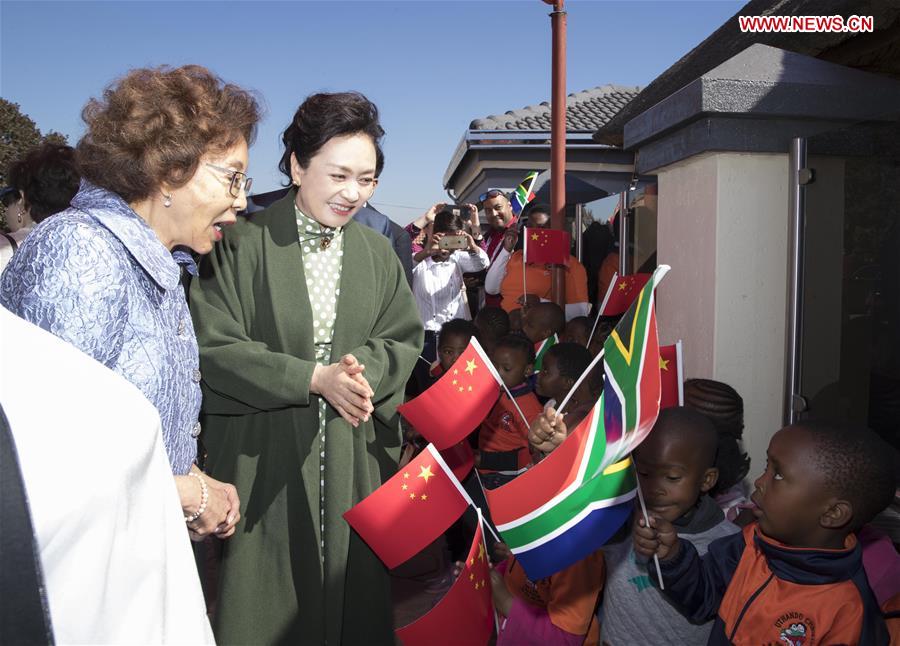


Peng Liyuan, wife of Chinese President Xi Jinping and a UNESCO Special Envoy for the Advancement of Girls' and Women's Education, visits Uthando Day Care Pre-school in the east suburb of Pretoria, South Africa, July 24, 2018. Peng was accompanied by Tshepo Motsepe, wife of South African President Cyril Ramaphosa during the visit. (Xinhua/Wang Ye)
PRETORIA, July 24 (Xinhua) -- Peng Liyuan, wife of Chinese President Xi Jinping and a UNESCO Special Envoy for the Advancement of Girls' and Women's Education, visited a pre-school in the South African capital of Pretoria on Tuesday.
Peng was accompanied by Tshepo Motsepe, wife of South African President Cyril Ramaphosa, and a representative of the African Self Help Association Trust during the visit.
Scores of South African children waving the national flags of China and South Africa shouted "welcome, welcome" in Chinese and English upon Peng's arrival at Uthando Day Care Pre-school in the east suburb of the capital.
The children sang in Chinese An Ode to the Goose, a short poem written in China's Tang Dynasty. Peng applauded their pronunciation and gave the children toys, stationery and books as gifts.
Peng said children bear upon the future of a country.
Moral education is the most important in early education, when the children should be guided to aspire high and cultivate their moral characters, she said.
Peng also called on the children to carry forward the friendship between China and South Africa when they grow up.

 Award-winning photos show poverty reduction achievements in NE China's Jilin province
Award-winning photos show poverty reduction achievements in NE China's Jilin province People dance to greet advent of New Year in Ameiqituo Town, Guizhou
People dance to greet advent of New Year in Ameiqituo Town, Guizhou Fire brigade in Shanghai holds group wedding
Fire brigade in Shanghai holds group wedding Tourists enjoy ice sculptures in Datan Town, north China
Tourists enjoy ice sculptures in Datan Town, north China Sunset scenery of Dayan Pagoda in Xi'an
Sunset scenery of Dayan Pagoda in Xi'an Tourists have fun at scenic spot in Nanlong Town, NW China
Tourists have fun at scenic spot in Nanlong Town, NW China Harbin attracts tourists by making best use of ice in winter
Harbin attracts tourists by making best use of ice in winter In pics: FIS Alpine Ski Women's World Cup Slalom
In pics: FIS Alpine Ski Women's World Cup Slalom Black-necked cranes rest at reservoir in Lhunzhub County, Lhasa
Black-necked cranes rest at reservoir in Lhunzhub County, Lhasa China's FAST telescope will be available to foreign scientists in April
China's FAST telescope will be available to foreign scientists in April